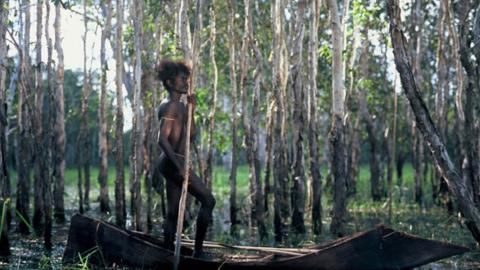

Ten Canoes
From Arnhem Land to Sydney via Mungindi, Hamilton, Mount Druitt, San Remo and elsewhere, students studying 'Ten Canoes' had the rare opportunity to speak to the film’s director Rolf de Heer and actor Frances Djulibing.
The latest in the series of NFSA Connects events continued to foster a sense of belonging for a national community of teachers and learners, putting them in touch with some of the nation’s finest creative artists on key works in the curriculum.
Ten Canoes allows us to glimpse the ancient world of the Yolngu through the story of a young warrior Dayindi (played by Jamie Gulpilil), who covets one of his older brothers’ wives. The story travels even further back to the Dreamtime and has a timeless quality that has made it an instant classic. Partly inspired by 1930s photographs of traditional people, Ten Canoes is a collaborative work with the Aboriginal community of Ramingining in the Northern Territory. Made in 2006, it was written and co-directed by Rolf de Heer (with Peter Djigirr) and is narrated by the legendary actor David Gulpilil.
How was Rolf’s understanding of Indigenous culture affected by making Ten Canoes? What were the difficulties he encountered with traditional customs and beliefs? What were Frances’s thoughts when she first read the script? What was her inspiration for acting? These were some of the questions from 280 NSW high school students during two Q&A videoconferences on 14 November 2011.
The morning session beamed out from the Australian Museum in Sydney. Rolf de Heer flew in from Adelaide and Frances Djulibing participated from the Bula Bula Arts Centre in Ramingining. Six public schools connected for their unique opportunity to speak to the creators of the text.
While Rolf seems not the type to engage in idle small talk, when it came to fielding the students’ questions he recounted in-depth stories and offered insights that no textbook could ever supply. Frances offered her unique perspective on working with Rolf and what the making of the film meant to the remote community of Ramingining. Thank goodness that we can share these insights with you all: more on that later!
Rolf and Frances generously agreed to do two Q&As on the same day, so for the afternoon session we moved across town to MLC School in Burwood, where the IT personnel had set up a bank of computers that would make NASA envious. About 50 MLC girls were the ‘live’ audience whilst four other independent schools dialled in via Skype.
Video/web-conferencing technology is gradually becoming a valuable tool in schools, adding rich learning to the study of a text. Virginia Woods, a teacher from St Francis Xavier school in Hamilton, Newcastle, said that videoconferencing ‘gives us a sense of belonging to a national community of teachers and learners.’
‘My students had the usual and expected feeling of awe that they were communicating directly with a film director … We had already viewed and read quite a lot of background material about the making of Ten Canoes but there were a lot of new insights,’ she continued. ‘I know they were particularly touched by the answers given by Frances.’
NFSA Connects is proud to have helped students become more inspired and engaged about their study of Ten Canoes. We are also pleased that the artists involved, Rolf and Frances in this case, were able to enjoy the interest that their work stirs in a high school audience. NFSA Connects sessions require lots of planning and demand that students turn up with passion and intelligence, our audience did that in spades.
Huge thanks are due to the IT staff, especially Dave Foley in Dubbo and Sujatha Gunja at MLC, who battled to bring the sessions to life. We also rely on the tireless dedication of teachers on the day (especially Craig Malyon, MLC). Our partnerships within the education sector are paramount: congratulations and thanks to everyone involved.
The Ten Canoes sessions were recorded and are available online.
Visit the Twelve Canoes study portal.
The National Film and Sound Archive of Australia acknowledges Australia’s Aboriginal and Torres Strait Islander peoples as the Traditional Custodians of the land on which we work and live and gives respect to their Elders both past and present.

